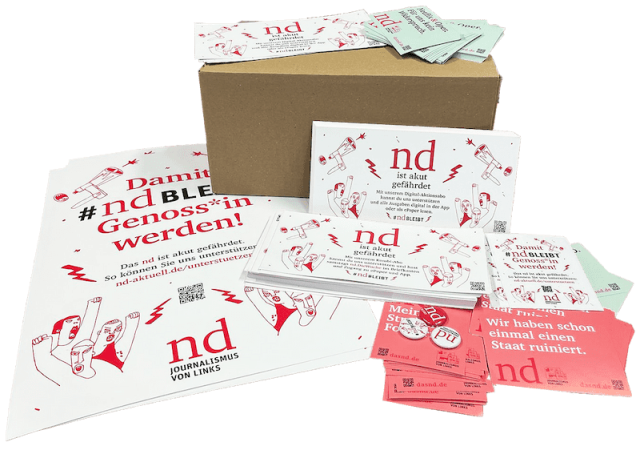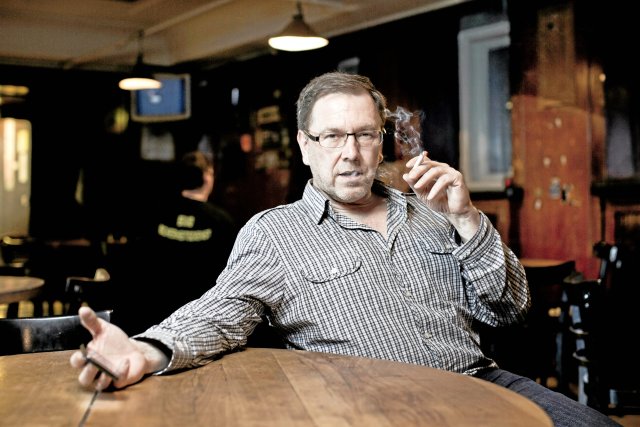When you were still allowed to smoke in the Volksbühne canteen: René Pollesch in 2013 with a cigarette and a smartphone.
Photo: Andreas Pein/laif
Countless legends surround Berlin’s Volksbühne on Rosa-Luxemburg-Platz. The quarter-century-long era under the direction of Frank Castorf was already a part of great theater history when it had just begun. Castorf had hung a portrait of Stalin in his director’s office. When I ask René Pollesch, who grew up in this house at that time and took over as artistic director himself in 2021, whose portrait could now be placed there instead, he thinks for a moment, points to the spot and finally says: “Donna Haraway maybe.”
That fits. The older, East Berlin stage berserker Castorf has always pursued his own strategy of brutally disrupting the culture of consensus and the Federal Republic’s winning mentality. Stalin was and is the right source for this. In his cerebral theater works, the younger Pollesch has always tried to quietly but persistently question all certainties, which the post-structuralist trained, socialist feminist Haraway also stands for.
This theory-loving Pollesch was born in 1962 as a working-class child in the Hesse hinterland. He was part of the first year of the Applied Theater Studies course at the Justus Liebig University in Giessen, which was founded in 1982 by the unorthodox Brechtians Andrzej Wirth and Hans-Thies Lehmann. Here he learned from the greats: George Tabori, Robert Wilson, Heiner Müller.
nd.DieWoche – our weekly newsletter

With our weekly newsletter nd.DieWoche look at the most important topics of the week and read them Highlights our Saturday edition on Friday. Get your free subscription here.
But what does a qualified applied theater scientist do? The path to the stage was predetermined, but it was not a resounding success. Pollesch was an unemployed artist in the 1990s and soon financed himself through scholarships. After the turn of the millennium, under the aegis of Frank Castorf, he was given the management of the Prater, the secondary venue of the Volksbühne, where he became a style-defining, influential author and director – and also the darling of a left-wing intellectual audience hungry for spectacle. He found this not only here, but also at the Deutsches Schauspielhaus in Hamburg, at the Burgtheater in Vienna, at the Schauspielhaus in Zurich and at the Staatsschauspiel in Stuttgart.
Anyone who experienced the Pollesch Theater was initially amazed! It was incredibly fast, short and entertaining, loud and wild. Years ago, Pollesch anticipated in the only meaningful way the discourse about representation that is currently being conducted on stages in a tiringly didactic and moralistically charged manner – the question of who can and may represent whom on a stage. And playfully. Suddenly there were no longer any characters standing on the ramp declaiming their roles; very lively actors became carriers of ideas and allowed worlds of thought to collide. The act was abolished. What Pollesch didn’t want to see on stage were – as he said – “authentic cows.” Just no fake tears.
Didn’t that make the theater a lecture hall? Not at all. For Pollesch, mastering theory did not prevent – no, it even required an unconditional will to entertain, to slapstick, to spiritualized boulevards. The stage design wasn’t just decoration, it played a part. The prompters were no longer sidelined, but sometimes took on the main roles. Text hang-ups were no longer played over, they were an event: people would brazenly shout “Shit!” and then virtuoso help came in dealing with the masses of text.
René Pollesch’s stagecraft, although often imitated, remained unmistakable. It also resulted from constant collaborations. Sophie Rois and Kathrin Angerer, Martin Wuttke and Fabian Hinrichs were his most important actors. For years, until his early death, he worked with the set designer Bert Neumann. Since then, Anna Viebrock and Katrin Brack have built his stages, and Nina von Mechow and Tabea Braun have created the costumes for his theater evenings.
The titles themselves often revealed the writer-director behind them: “Socialist actors are harder to convince of a director’s idea,” “Of someone who moved out because he could no longer afford the rent,” “The rise and fall of a curtain and his Life in between” for example. Evil tongues said that all the productions were ultimately similar. This judgment was the result of the most superficial observation. All his productions had one thing in common: the rejection of a lying bourgeois theater of illusion and the attempt to penetrate the present philosophically and theatrically. With very different results – sometimes they were outstanding and left the audience drunk on ideas.
It was Pollesch’s proud teacher Hans-Thies Lehmann who told me about the overwhelming Zurich stage spectacle »The stage is clear for Mick LevCik!” and its puzzling title. During rehearsals for this production, which sought to explore Brecht’s “Antigone model,” they first read “Donald Duck” comics together. The anthology “Alles Theater” and the story “Set the stage clear for Mick Leflic” contained therein were the inspiration for the title. The creation of a work of art naturally remains a mystery to the critic, this eternal secondary talent – but here an idea emerges of how theater came to life under the director Pollesch. Even searching in remote places, witty, fearless. Only here could Mickey Mouse meet Bertolt Brecht.
After the politically desired end of Frank Castorf’s directorship and the subsequent severe damage to the Volksbühne, it was logical to hand over management of the house to Pollesch. The expectations placed on him were high and so varied that it was impossible for them all to be met. The disappointments were inevitable – and yet all the alternative suggestions mainly evoked a tired smile. The attempt to make the Volksbühne a place for artists is now experiencing another major turning point.
René Pollesch’s productions were overwhelming yet inviting, intellectual and extremely entertainingly playful. This extremely productive theater maker was responsible for several hundred evenings and died very suddenly on Monday morning at the age of just 61. What this loss means – not only for the Volksbühne, but for contemporary theater in general – can hardly be estimated.
#ndstays – Get active and order a promotional package

Regardless of whether it is pubs, cafés, festivals or other meeting places – we want to become more visible and reach everyone who values independent journalism with an attitude. We have put together a campaign package with stickers, flyers, posters and buttons that you can use to get active and support your newspaper.
To the promotional package
sbobetsbobet88judi bola judi bola link sbobet judi bola online
